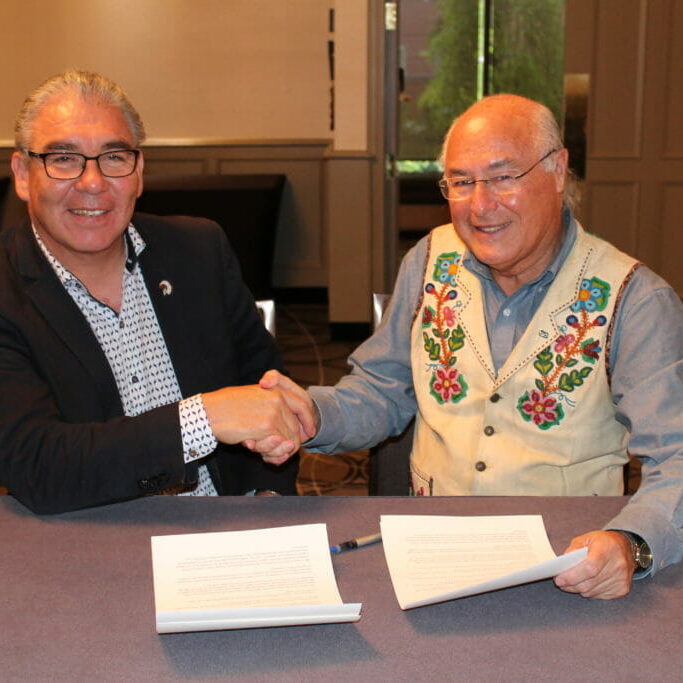
Métis Nation speaks out against Nova Scotian self-identifiers
MOU states the Métis and Mi’kmaq will work together to address the issue
More Nova Scotians are claiming Métis heritage and attempting to access Aboriginal and Treaty rights.
“This is a new phenomenon since the ’80s that people are emerging in Eastern Canada claiming to be Métis,” says Métis National Council President, Clément Chartier. “There are dozens of these cases in Eastern Canada where they have not been able to prove ancestry.”
As of the 2016 Census, Statistics Canada reports a spike in Nova Scotians identifying as Métis from 3,095 in 2011 to 6,905 – double what it was before. But the reality of the situation is that the Métis have no claim to rights in Nova Scotia, and those with official status don’t want it.
“It is not a matter of race, it is not a matter of blood, it is a matter of belonging to a political or cultural entity or people and that’s what’s at stake,” said Chartier. “This [trend] is a big disservice to the Métis Nation – it attacks our integrity, it attacks our nationhood and attacks our being, our spirituality and our existence as a people.”
On Sept. 27, a memorandum of understanding was signed between representatives of the Mi’kmaq and the Métis peoples, addressing the recent movement of self-identifying Métis in Nova Scotia. Both nations will be collaborating to ensure that the issue is resolved and promising to establish cultural awareness initiatives to educate the general public.
“The term Métis is an actual nation and documented nation we know; they have a documented, traditional homeland that is Ontario westward. They have their own culture and practices, they have their own history and they have fought for their own recognition,” said Zabrina Whitman, Senior Policy Analyst for Kwilmu’kw Maw-klusuaqn (Mi’kmaq Rights Initiative) Negotiation Office.
“For groups outside of the Métis homeland to be defining themselves as Métis, it goes against what the Métis nation is saying who their people are.”
It was in 2003 when the Supreme Court of Canada affirmed the existence of Métis rights during the case of R. v. Powley. In this case, Steve and Roddy Powley – two Métis men – were charged with “unlawfully hunting moose and possessing game hunted in breach of the Game and Fish Act.”
The Powleys pleaded not guilty and were acquitted, because under Section 35 of the 1982 Constitution, Métis have the right to hunt for food and water.
Now, there’s a basic legal test, called the “Powley Test” that an individual must pass in order to be considered Métis by the government: the person must identify as a Métis person, be a member of a present-day Métis community and have ties to a historic Métis community. Since then, the Métis have fought hard for the acknowledgement they now receive.
These self-identifiers could change that.
“I can’t speak for the other provinces, but for a great many in Nova Scotia, the majority of them [the people claiming Métis status] are saying their lineage is to someone who is Mi’kmaq in the last several hundred years but that doesn’t mean they’re Métis,” said Whitman. “Métis is someone who is a part of the Métis Nation. Potentially does it mean that they have Mi’kmaw ancestors at one point in their history? Yes, but that doesn’t mean that they’re Métis.”
“The Métis Nation is its own nation, they have their own culture, their own practices, their own history and their own language and so people to identify as Métis outside of the Métis traditional territory is not respecting their nationhood as an Indigenous Nation.”
Looking to the future, Whitman believes that the solution will be resolved in a positive way. “I think that’s what’s significant: is ensuring that people are using the appropriate terminology and that individuals have a proper understanding of the Nations, of these terms and of the history of Canada and the Indigenous Nations that live here.”
As for Chartier, he is looking for the problem to be resolved and for the Métis peoples to continue to avoid any potential negativity that may come down on them because of this situation.
“The Métis Nation is a distinct people based in western Canada with our own language, our own customs and traditions, culture and rights and so we don’t call ourselves a mixed ancestry people. We’re not. We are a distinct, full-fledged rights-bearing Indigenous people: The Métis Nation,” said Chartier.
“The big distinction is the Métis Nation is a people and not an adjective to describe people of mixed ancestry.”






